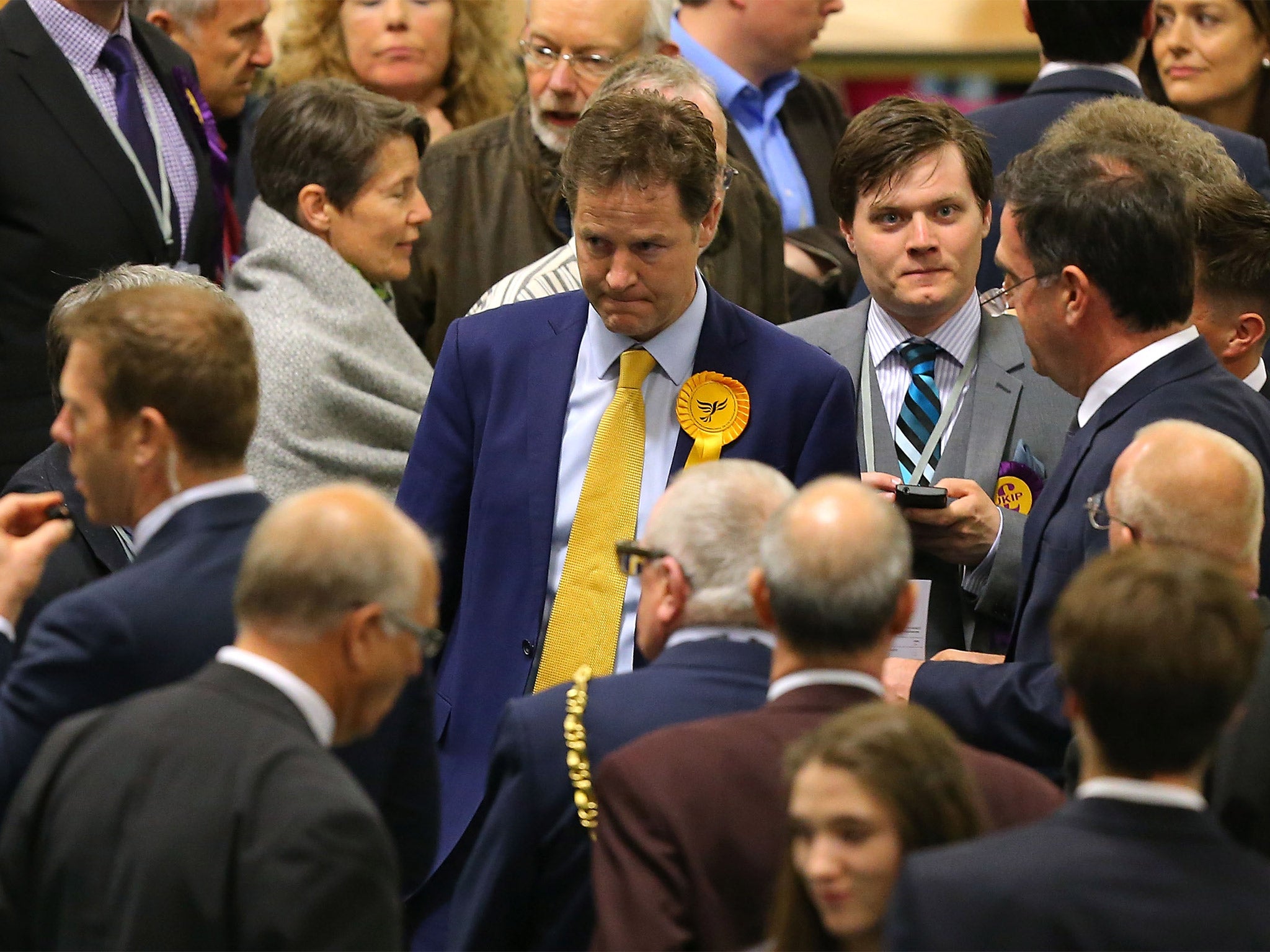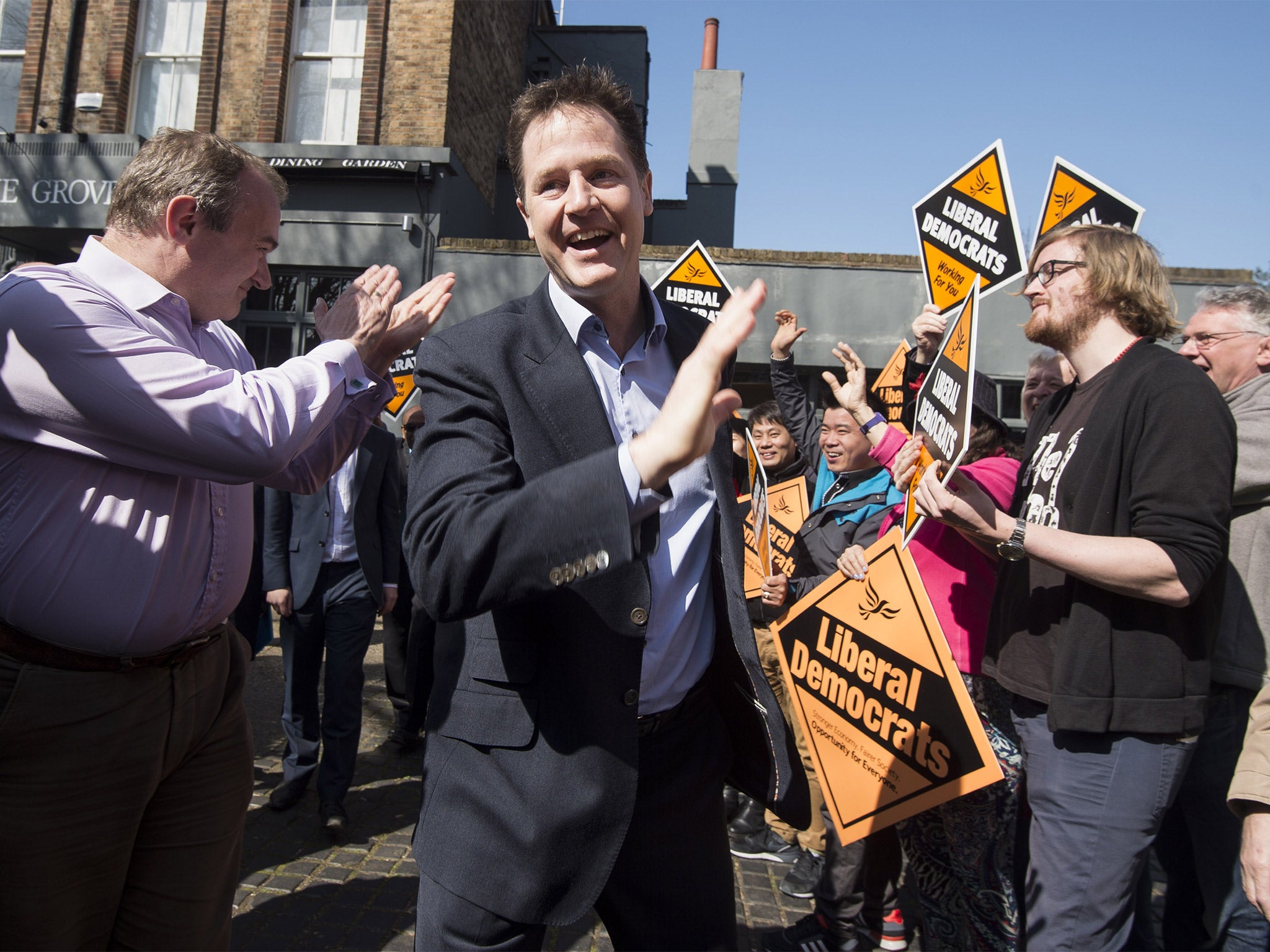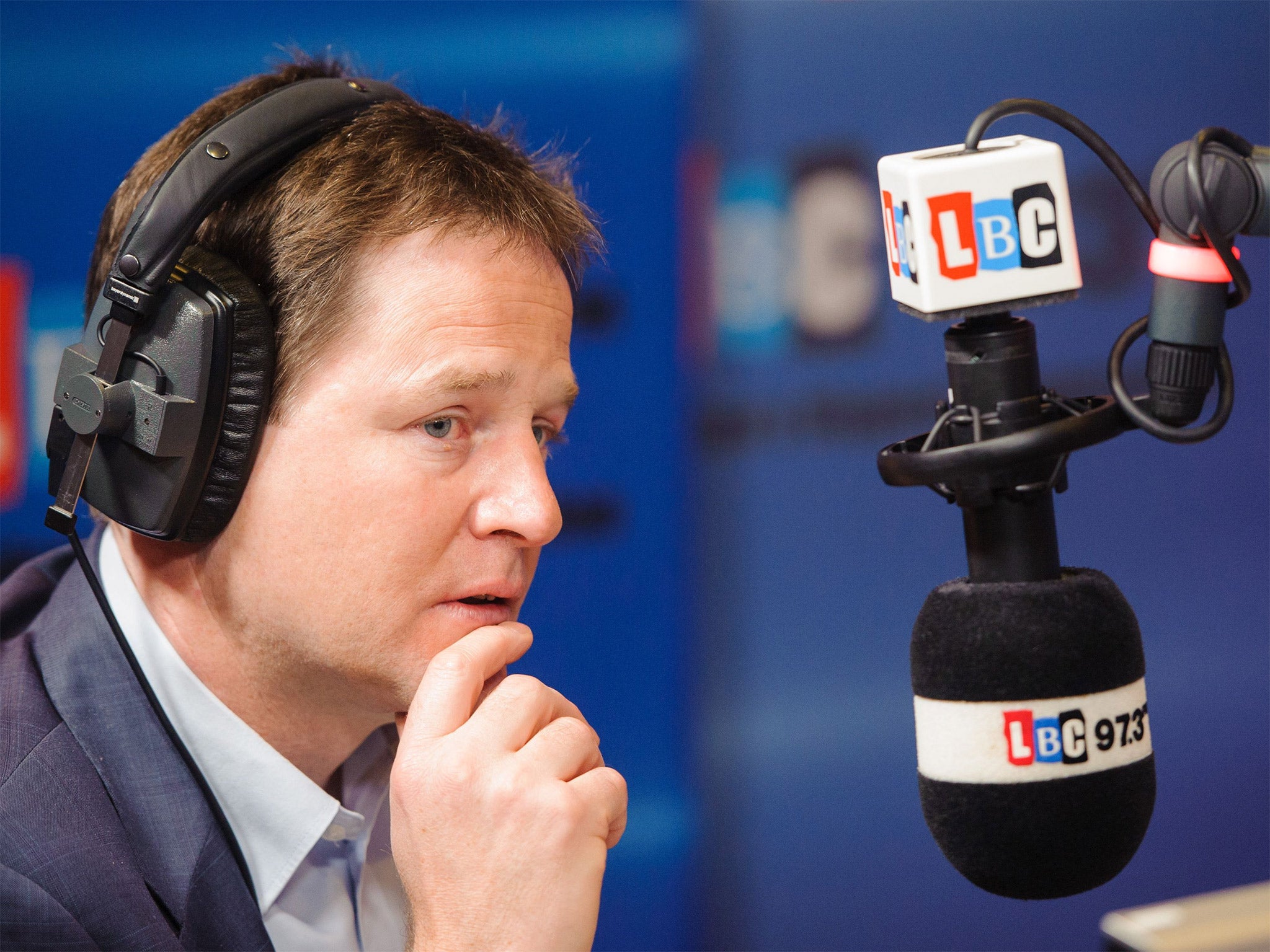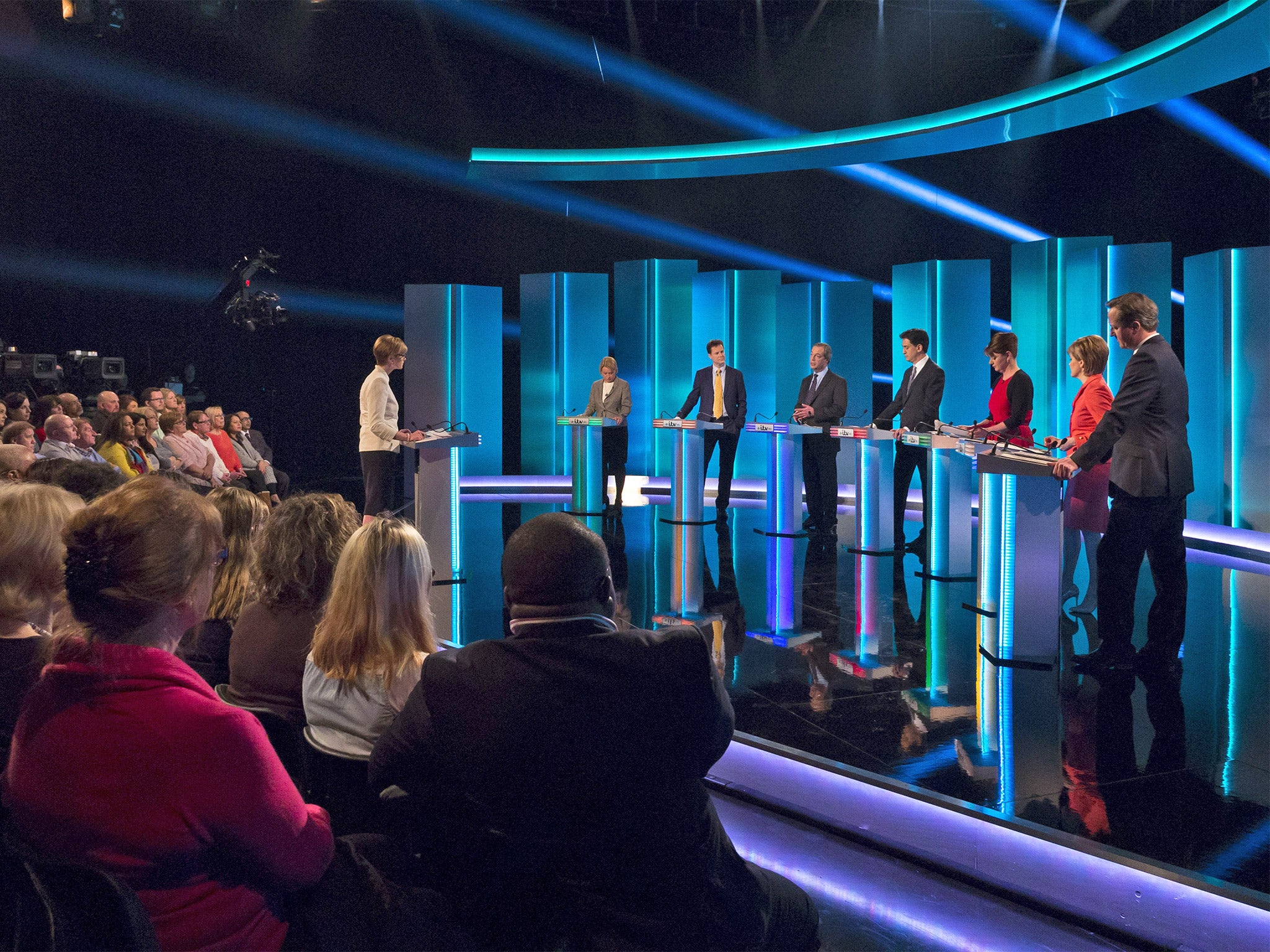Nick Clegg interview: 'We've been very damaged electorally but at least our soul is intact'
Nick Clegg led the Liberal Democrats to power, and then to the wasteland. As the party gathers for its conference against the backdrop of Labour's upheavals, he gives his first print interview since quitting the helm to Toby James, Duncan Brack. And conviction politics is on his mind >

Your support helps us to tell the story
From reproductive rights to climate change to Big Tech, The Independent is on the ground when the story is developing. Whether it's investigating the financials of Elon Musk's pro-Trump PAC or producing our latest documentary, 'The A Word', which shines a light on the American women fighting for reproductive rights, we know how important it is to parse out the facts from the messaging.
At such a critical moment in US history, we need reporters on the ground. Your donation allows us to keep sending journalists to speak to both sides of the story.
The Independent is trusted by Americans across the entire political spectrum. And unlike many other quality news outlets, we choose not to lock Americans out of our reporting and analysis with paywalls. We believe quality journalism should be available to everyone, paid for by those who can afford it.
Your support makes all the difference.TOBY JAMES: To what extent do you think you achieved what you aimed to achieve when you became leader?
NICK CLEGG: Well, clearly under my time as leader, we have succeeded far, far more in shaping the real world than in promoting our own electoral interests. I think only the most unfair commentator would do anything other than acknowledge that we have made a massive imprint on a lot of people's daily lives. I couldn't give you a whole list but it's quite a remarkable exercise, I think, of translating in many cases quite radical policies into practice with only eight per cent of the MPs in Parliament. I genuinely can't think of an example of a party which has punched so solidly and courageously above its weight. But clearly it has been accompanied by – or caused by, that's the great debate, which I'm very happy to go into – a catastrophic loss of electoral support. I can't pretend that that side of the ledger was anything other than pretty poor. But the other side of the ledger is unprecedented for us as a party, we've never got so much done.
DUNCAN BRACK: Do you think Liberal leaders are different from those of the other two main parties; that actually one of our main challenges is just to get noticed?
NC: I think the thing which is so tough for us is that even when we did get noticed, we still got hammered. I'm absolutely convinced that one of the reasons why we got so badly hammered in this last election is because towards the end of the election campaign the overriding emotion among English voters was fear, fear of what might happen if Miliband and Salmond did a deal. And of course what you don't do if you're fearful is to turn to a party that has been so remorselessly typecast as weak. So we are either ignored or mocked, as we have been in opposition; or, when we were in government, we were ruthlessly and successfully typecast as somehow being weak, having lost our souls, sold out our principles, turned in on ourselves and all the rest of it. In fact, the truth was that we had been remarkably strong and resilient over a long period of time.
There's a real issue here. The vested interests in the press ignore and mock you when you're in opposition. I had thought that by the time we were in government, and got our hands on the levers of power, we would at least get a fairer hearing – but the reverse happened. With hindsight, logically, if you are the editor of the Daily Mail, or the Daily Mirror or whatever, you can afford to ignore us when we are nowhere near power. When we're near power, we are deeply offensive to their business model, so they have to turn on us – and boy, did they. Then, of course, that was supplemented by the endearing, if somewhat slightly unwelcome, tendency of Liberal Democrats to, when any critic said anything about us, instead of doing what the other parties do, which is to reject them outright, we'd say: "Well, they might have a point actually!"
What I tried to do, about halfway through this last parliament, was to accept that there were these big vested interests in the papers, so not to waste any time on them; I would try any possible way I could to work around them. So I did the LBC thing [a weekly radio show in London], I went on late-night chat shows, I did Twitter, town halls, our traditional way of delivering messages through letterboxes – anything I could think of. The way I visualised it was to think: "OK, we've got these massive vested interests, who are telling millions of people every day, as they read their papers over their egg and bacon, how ghastly we are. We've got to try to provide a countervailing story." I couldn't think of any other logical way than trying to work round this great big obstacle. It is a huge problem.

One other thing which has occurred to me, and I see this inevitably through the prism of tuition fees: I'm pretty sure that if one of the other party leaders had had to commit the decision on tuition fees, they would have had significant vested interests who would have tried to cover their backs for them. They would have explained; they would have provided the narrative which at least would have tried to explain to the public why we did it. We had none of that. It was an incredibly vulnerable position, a very exposed position, to be in. It will be a big, big challenge for my successors, and I will do everything I can to try to help them through it because it's remorseless.
TJ: Could you talk through your thinking behind the electoral strategy that you devised throughout your time as leader? In terms of where you were looking to win or retain seats.
NC: I know many people would disagree, but my own view is that at the outset of this recent campaign, our electoral strategy and our electoral refrain made a lot of sense. We were saying that you could both sort out the economy and have a fair society – and not be forced to choose between the two. Then what happened, about a week or 10 days before the election, it was a bit like doing an exam in school, and the examiner coming up to you while you're busily finishing your essay and gently pulling away the paper you're working on and just slipping in a completely different question. Suddenly the question became, in England: "How can we stop Miliband and Salmond?" To which suddenly we were not the answer. Head, heart and all this stuff, strong economy, fair society, was an irrelevant answer to the much more visceral topic of "we just don't want Miliband dancing to Salmond's tune".
I remember saying to my team a week before the election that the only thing we could have done to change the weather at that stage would have been to say that under no circumstances whatsoever would the Liberal Democrats ever enter into a coalition with Labour. That would have helped stem the flight of voters to the Tories, but it would have been inconsistent with our identity as an independent party.
[As a result, this] allowed the Tories to ring up our voters, as they did in huge numbers, and say: "Nick Clegg hasn't ruled out a coalition with Labour, you know." As, of course, I couldn't – it would have been the end of the identity of the Liberal Democrats if I had. It was the only thing that would have made a difference, electorally, at the end, and I'm pretty convinced it would have been the surest way to have saved more seats, but it would have damaged our soul. We've been very badly damaged electorally but at least our soul is still intact. And at the end of the day, that matters, because it means there is a route forward.

DB: To the extent that we had a core vote in 2010, people like graduates, people in education, public-sector professionals, we almost seemed to go out of our way in the coalition to piss them all off. Do you think that is fair? Do you think we could have done things differently?
NC: I tell you what I think is fair – and I direct this to myself and actually to all of us – that what I think is a great strength and a great weakness of the Liberal Democrats is, while other parties are very aware of their interests, we are not. I noticed this when having policy discussions with the Tories; suddenly, the debate was closed down and they said, "We're not going to do that to our people, we just won't do it." I remember a conversation about property taxation – the way in which we tax property in this country is clearly bonkers – and at the end of lengthy discussions, when at one point George Osborne was tempted to accept a mansion tax in return for other things we would concede to him – the answer I got from David Cameron was, "No, I won't do that because my people won't like it." Full stop, end of story. What was rather touching, but also flawed, in our approach is that we are quite an intellectual party. We have a very intellectual machinery. We labour over policy, but we forget at the end of the day that voters are not policy entities, they are people who worry about their own interests and the interests of their family and their community. We think with the head, most people vote with the heart. I think the other parties are much more attuned to the idea that they are representing certain interests and they're in office to defend those interests – even, frankly, when it bumps up against rational policymaking. We always allow rational policymaking to trump interest. I think that is very admirable because it means we are a party of values and policies, rather than vested interests, but it's not electorally always the smartest way to conduct business. So I do accept the criticism.
TJ: How successfully did you manage your party?
NC: While I still think we can sometimes move with a sloth-like grace under the pressure of the 24-hour media demands, I genuinely think that the open, deliberative, collective way of making decisions remains an overwhelming strength rather than a weakness. I really wouldn't want to see it replaced. I think you do need sometimes to cut through it, taking rapid decisions and all the rest of it, but I think on the whole it has been the secret weapon for the Liberal Democrats, given the pressure we've been under. So I wouldn't mess too much with that.
The only thing I would say as a leader – and I'll be very careful to say this in a way which doesn't sound whingey, because I'm not – but I have noticed that in other parties, perhaps most particularly the Tory party, they understand intuitively that you have to protect the leader when he or she is under pressure, so the leader can speak in as undamaged a way [as possible] to the public. They'll circle the wagons, they'll create diversions, they'll get other people to carry the can for things that have gone wrong – until they no longer want them and then they ruthlessly decapitate them!
I did at times slightly feel that when the Liberal Democrats were under pressure, people would say, "Well, it's nothing to do with us. What's the leader got to say about it?" I think we do need to understand that under the remorseless pressure of the 24-hour media, if you have a spokesperson – the leader – it makes sense for the rest of the cast to allow that person to continue to speak loudly and clearly from the pulpit you've given them. Don't give a leader a pulpit and then, in a sense, expect them to also carry the can for all the difficult stuff.
To be fair, Paddy [Ashdown] did that for me in the latter stages of my leadership. You've no idea what a difference it made to me when I felt I didn't always need to be the person on the Today programme, to have to defend difficult stuff. Malcolm Bruce was brilliant as well, he would just get on with it. You have that in politics, you've got difficult stuff to deal with, but don't ask the leader always to be the person who fronts up the rubbish – because then the public associate the leader with negative news. In the latter stages I felt we'd got it right. The fact we hadn't earlier is my failing, not anybody else's. The next leader needs to have people around them who are just prepared to act as a diversion or to carry bad news.

TJ: What personal characteristics do you think leaders need to have?
NC: Physical resilience. Seriously. Do not underestimate how physical front-line politics is. It is an unbelievably physical job; it was one of the things that surprised me the most. I learned the hard way, because I didn't look after myself for the first year or so, and my health suffered. I then got fit, ate better, did exercise, kickboxing regularly, and so on. Physical resilience is unbelievably important.
Secondly, infinite amounts of patience: in the sense that so much of politics now is breathless, hyperbolic, who's up, who's down, nasty backstabbing and all the rest of it. You just have to keep a sense of patience and perspective – and then be clear in your own mind about what you're trying to do, and go for it. If you fail, at least you've given it your best shot. That's always the philosophy I've taken. Clearly, electorally, what I tried to do did not work for one reason and another, but I think that it's better to go for something rather than constantly hedge your bets. I don't personally think there is much point being a leader of any organisation just to be the leader. In my view it's much better to go for something, which is at least worthwhile pursuing, to take chances and to succeed or fail. I think the worst thing to do is to want to be leader just because you want to be leader. So, physical resilience, patience and perspective – and a willingness to set out the values that you care about. Go for it, go for broke and then be big enough to accept the consequences of success or failure.
This is an edited extract from 'British Liberal Leaders' (Biteback), edited by Duncan Brack and Toby James. Duncan Brack is editor of the Journal of Liberal History and former director of policy for the Liberal Democrats. Toby James is senior lecturer in politics at the University of East Anglia
Join our commenting forum
Join thought-provoking conversations, follow other Independent readers and see their replies
Comments